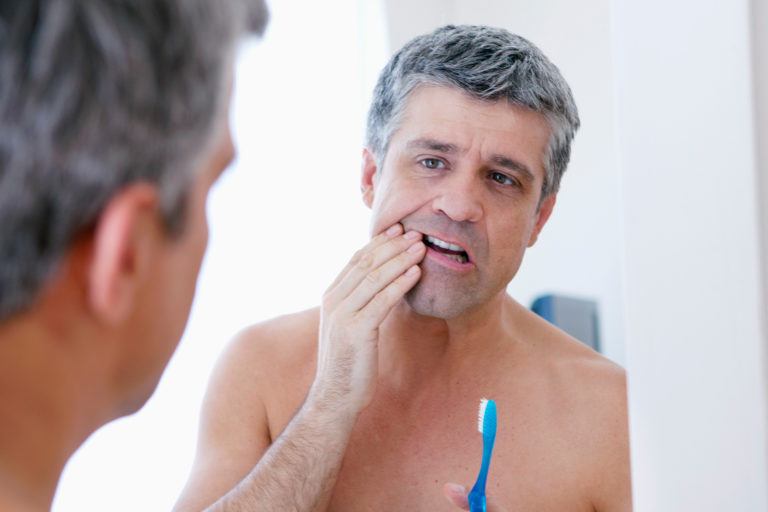
Tooth trouble is seriously annoying. It’s not like you can just stop eating and drinking until the problem is fixed, and you are left suffering in the meantime. Tooth sensitivity can be particularly annoying when caused by the temperature of a favorite food, like ice cream or coffee. The days can get mighty long without sugar and caffeine. Never fear! There are steps you can take to regain your tooth strength, and those delicious foods and beverages you’ve been missing. Your teeth will be more sensitive when they have cavities, fractures or cracks, worn-out enamel, or an exposed root. These are caused by several factors, such as injury, erosion, or bad habits, but can generally be prevented with good dental hygiene. This should be your first line of defense. Once the damage is done, steps can be taken at home and at your dentist’s office, to improve sensitivity.
Urgent Dental Problems
- Broken tooth/teeth
- Suspected dental infection
- Severe dental pain
- Fever with dental pain
- Swollen, red gums
Best Treatments for Sensitive Teeth
Practice good oral hygiene
A healthy mouth will mean less sensitive teeth and gums. The causes of sensitive teeth include poor hygiene and deterioration over time. Take preventative measures to keep your mouth clean and happy by brushing twice a day, flossing/using a mouthwash between meals, and eating healthy. Also, use a good toothbrush; throw it out every few months (earlier if it wears out), and replace it with a shiny, new one. I personally love the ones with the tongue cleaner on the back; get as much gunk out of your mouth as possible. You could also give an electric toothbrush a go. There are lots of options like this Oral-B Rechargeable Toothbrush from Braun, at Amazon.
Good oral health has so many benefits, beyond helping your sensitive teeth. If nothing else, you will end up with a whiter, brighter smile, and get rid of stained teeth if you brush and floss regularly.
Avoid habits that are bad for your teeth and your health
As the dangers of smoking and chewing tobacco are well publicized, I won’t go into them here. There are obvious health concerns with bulimia, but maybe less well-known is the harm to teeth. All that stomach acid coming back up wears down your enamel. Gastroesophogeal reflux disease (GERD) has a similar effect, although not self-inflicted. Then there’s teeth grinding. And be careful when playing contact sports or other activities that may result in broken teeth (or other body parts, for that matter). Contact your dentist for help with these concerns.
Switch to a toothpaste designed for sensitive teeth
The active ingredient here is potassium nitrate. One of the more popular brands is Sensodyne (which you can get at Amazon), but nearly every major brand makes some sort of toothpaste geared towards improving tooth sensitivity. Your dentist can recommend which might be the best, or you can check the boxes for a stamp from the American Dental Association, endorsing the benefits of the product. Remember that results don’t happen overnight; it may take several weeks for improvement. Immediate gratification will have to be set aside.
Use flouride
Fluoride helps keep enamel strong and can help rebuild it. That’s why it’s usually in toothpaste, but check out other dental hygiene products with fluoride. My dentist told me to try a mouthwash with fluoride for daily use when my enamel started wearing thin in spots. He specifically recommended ACT, but there are other brands that may be just as effective. They also make floss with fluoride in it. Your dentist can provide you with a fluoride gel treatment at your next visit to strengthen your teeth.
See your dentist
Your dentist can provide more significant treatment for sensitive teeth. A dentist is always going to have the best advice when it comes to teeth, and they can also provide services for serious sensitivity problems. He or she can seal your teeth (in the case of receding gums) with a plastic-type substance, giving them another layer of defense from sensitivity and decay. When your teeth are stubbornly sensitive with nothing else helping, root canals are sometimes performed. This is when damaged pulp tissue inside the tooth root is removed and the root is cleaned and sealed. I hear they’re fun.
Home Remedies
Softer Toothbrush
You could be wearing down your teeth by brushing too forcefully, or with too firm of a toothbrush. A smaller, gentler brushing can help sensitivity in this case while cleaning away additional problems.
Desensitizing Toothpaste
There are many brands to try. Check with your dentist for what kind he or she recommends, or look for the ADA seal of approval on the box.
Fluoride Mouthwash
A bit spendier than standard mouthwash, but the fluoride will strengthen your enamel over time, easing sensitivity.
Dental Hygiene
I know, I know, you’ve been hearing it since you were a little kid first learning to brush your teeth. “Be sure to brush and floss every day!” But sometimes you pass out after a bender before scrubbing your pearly whites, or your cat decides your toothbrush is his favorite new toy and you don’t have a spare one handy. And flossing? Who can be bothered with that painstaking task? You should because dental hygiene really is important. Your mouth is a disgusting, bacteria-filled place even on good days, and slacking off in that department can cause bigger problems than just sensitive teeth. By spending ten bucks on a toothbrush, toothpaste, and some floss (and using them), you will save yourself hundreds in dental bills—and you won’t have to suffer through the pain of bad teeth and the sadistic drilling dentists employ to fix them.